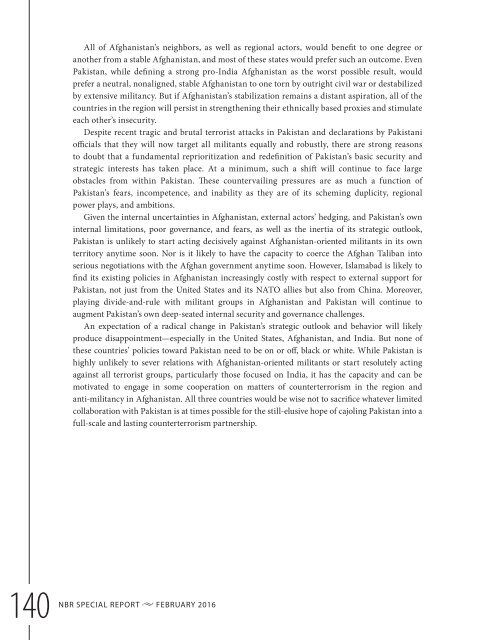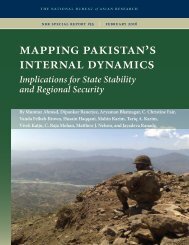pakistan’s
SR55_Mapping_Pakistan_February2016
SR55_Mapping_Pakistan_February2016
Create successful ePaper yourself
Turn your PDF publications into a flip-book with our unique Google optimized e-Paper software.
All of Afghanistan’s neighbors, as well as regional actors, would benefit to one degree or<br />
another from a stable Afghanistan, and most of these states would prefer such an outcome. Even<br />
Pakistan, while defining a strong pro-India Afghanistan as the worst possible result, would<br />
prefer a neutral, nonaligned, stable Afghanistan to one torn by outright civil war or destabilized<br />
by extensive militancy. But if Afghanistan’s stabilization remains a distant aspiration, all of the<br />
countries in the region will persist in strengthening their ethnically based proxies and stimulate<br />
each other’s insecurity.<br />
Despite recent tragic and brutal terrorist attacks in Pakistan and declarations by Pakistani<br />
officials that they will now target all militants equally and robustly, there are strong reasons<br />
to doubt that a fundamental reprioritization and redefinition of Pakistan’s basic security and<br />
strategic interests has taken place. At a minimum, such a shit will continue to face large<br />
obstacles from within Pakistan. These countervailing pressures are as much a function of<br />
Pakistan’s fears, incompetence, and inability as they are of its scheming duplicity, regional<br />
power plays, and ambitions.<br />
Given the internal uncertainties in Afghanistan, external actors’ hedging, and Pakistan’s own<br />
internal limitations, poor governance, and fears, as well as the inertia of its strategic outlook,<br />
Pakistan is unlikely to start acting decisively against Afghanistan-oriented militants in its own<br />
territory anytime soon. Nor is it likely to have the capacity to coerce the Afghan Taliban into<br />
serious negotiations with the Afghan government anytime soon. However, Islamabad is likely to<br />
find its existing policies in Afghanistan increasingly costly with respect to external support for<br />
Pakistan, not just from the United States and its NATO allies but also from China. Moreover,<br />
playing divide-and-rule with militant groups in Afghanistan and Pakistan will continue to<br />
augment Pakistan’s own deep-seated internal security and governance challenges.<br />
An expectation of a radical change in Pakistan’s strategic outlook and behavior will likely<br />
produce disappointment—especially in the United States, Afghanistan, and India. But none of<br />
these countries’ policies toward Pakistan need to be on or off, black or white. While Pakistan is<br />
highly unlikely to sever relations with Afghanistan-oriented militants or start resolutely acting<br />
against all terrorist groups, particularly those focused on India, it has the capacity and can be<br />
motivated to engage in some cooperation on matters of counterterrorism in the region and<br />
anti-militancy in Afghanistan. All three countries would be wise not to sacrifice whatever limited<br />
collaboration with Pakistan is at times possible for the still-elusive hope of cajoling Pakistan into a<br />
full-scale and lasting counterterrorism partnership.<br />
140<br />
NBR<br />
SPECIAL REPORT u FEBRUARY 2016



